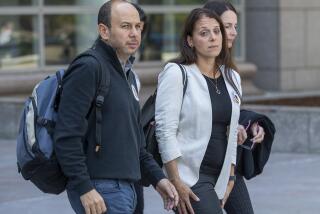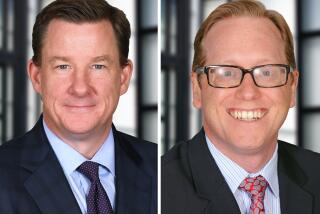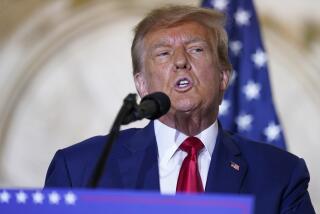Shapiro, Bailey Rift Erupts, Splits Simpson Team
On the last weekend before O.J. Simpson goes on trial for murder, two of his celebrated lawyers are on the outs, with veteran litigator F. Lee Bailey being ejected from Robert L. Shapiro’s suite of offices and his name removed from the letterhead of the Century City firm, Shapiro confirmed.
The third attorney in the former football star’s powerhouse legal triumvirate, Johnnie L. Cochran Jr., who is not involved in the dispute, is mediating between the two in a rift that has left Shapiro and his former mentor “not speaking,” Shapiro said Sunday.
A source close to the defense confirmed that Cochran would attempt to reconcile the two and said Cochran was very concerned that the split would hurt Simpson’s case.
Opening statements in the case are scheduled to begin Thursday.
Shapiro said he does not want Bailey, a legendary courtroom presence, to take any major role in court, contending that Bailey’s role all along was to be as a consultant, and that he does not want that role to grow in any way.
“It’s very painful. . . . I’m glad it’s coming out into the open so it can be aired,” Shapiro said.
“We can’t have snakes in the bed trying to sleep with us,” Shapiro said.
Exactly what part Bailey will now play in the case has been left up to Cochran, Shapiro said.
Bailey had left his Los Angeles hotel Sunday night and could not be reached for comment.
Bailey, the famous Boston attorney, is a former mentor of Shapiro’s; they have known each other for a quarter of a century. He is the godfather of Shapiro’s eldest son, and Shapiro, who was instrumental in bringing Bailey onto the team, represented the 61-year-old Bailey in a drunken driving case in 1982.
The schism between the two in the triple array of star power and firepower that commentators called the “legal dream team” and Shapiro lightly referred to as “the three tenors” was noted as early as last fall, with conflicting strategies and contests of wills. But the defense and observers were convinced that the team could subordinate any personal disagreements to the common goal of acquitting Simpson.
Now the team has apparently split over leaks to the press, most critically the transcript of the police interview with Simpson one day after the murders in June of his ex-wife, Nicole Brown Simpson, and her friend, Ronald Lyle Goldman.
Last week, when Bailey cross-examined a witness for the first time, at a hearing on whether allegations of domestic abuse should reach the jury, Bailey and Shapiro sat as far from each other as possible at the defense table.
Shapiro made it clear Sunday that while he had no evidence of misconduct by Bailey, he did have reason to believe that one or more of the investigators brought into the case by Bailey might have been the source of leaks.
Sources said one investigator accused Shapiro of leaking the transcript to a supermarket tabloid in exchange for $5,000.
Shapiro vehemently denies it. He acknowledged brief contact with an editor of the tabloid at a Beverly Hills restaurant but believes the encounter was used to “set me up” as the possible source of a leak.
“I have never at any time been the source of any leak in this case,” he said.
Other leaks, some denigrating Shapiro, began appearing some months ago in East Coast media outlets.
Matters came to a head earlier this month, Shapiro told The Times, when he returned from Hawaii after the holidays and learned that the defense’s own internal investigation into leaks had looked into John E. McNally, an investigator brought on by Bailey.
McNally, a former New York police detective who collared the famous jewel thief Murph the Surf, worked as a private investigator for Bailey in the defense of kidnaped newspaper heiress Patricia Hearst.
Shapiro said he asked for a private meeting with Johnny Cochran--which Bailey tried to interrupt. At that point, he said, their relationship broke off.
As the defense team wrestled with leaks, Leroy (Skip) Taft, Simpson’s business attorney, reportedly suggested that everyone on the defense team sign statements saying that they were not the source of leaks, and if they were found to be, they would resign.
Bailey supposedly asserted that they were all professionals, friends and adults, and refused to sign, as, ultimately, did everyone else.
Times legal affairs writer Henry Weinstein contributed to this story.
More to Read
Go beyond the scoreboard
Get the latest on L.A.'s teams in the daily Sports Report newsletter.
You may occasionally receive promotional content from the Los Angeles Times.










